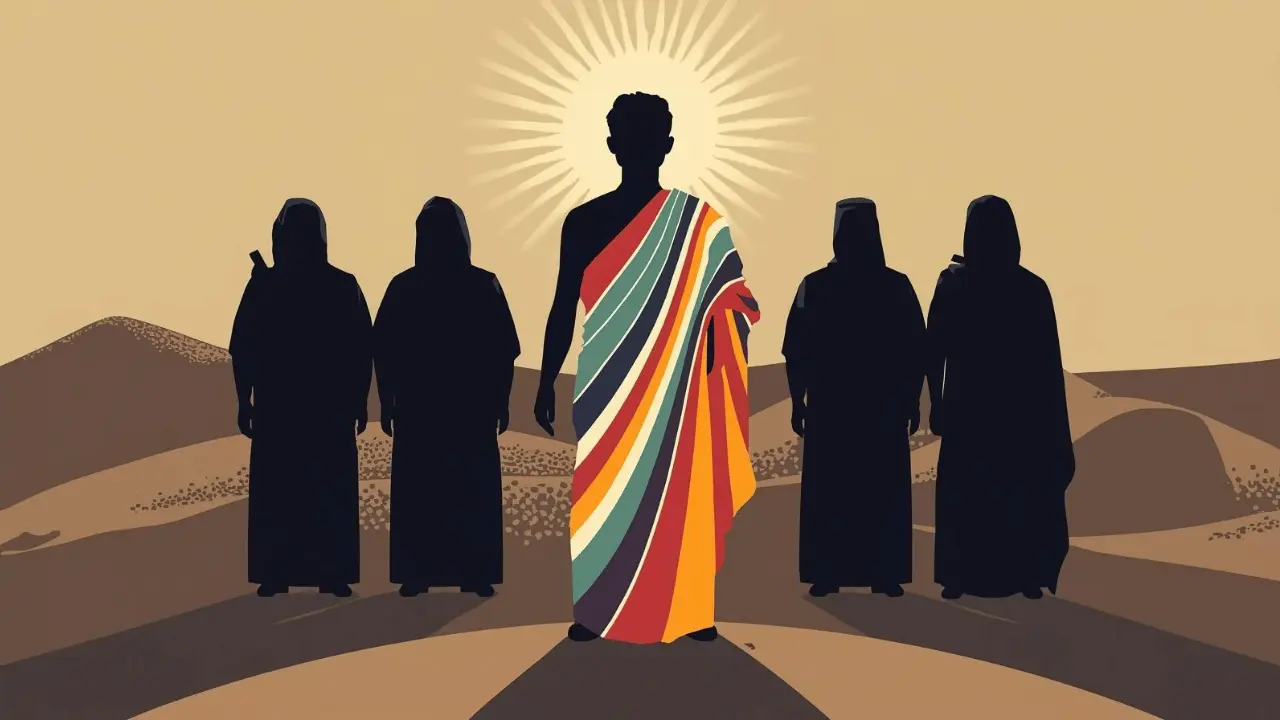Joseph’s story is more than a rise from the pit to the palace; it is the quiet shaping of a heart that learned to trust God when nothing made sense. Every trial, every delay, and every lonely moment became part of God’s hidden preparation.
His life reminds us that even in silence, God is speaking — shaping our character, deepening our faith, and preparing us for the promise He has already planned.
1. Joseph’s Calling Began Through God
Early Spiritual Sensitivity
At seventeen, Joseph received dreams that foretold leadership and influence (Genesis 37). They were not born of ambition but reflected a young heart already sensitive to God’s voice.
How Dreams Functioned in Biblical Culture
In ancient Israel, dreams carried deep spiritual meaning and were seen as channels of divine revelation. Joseph’s dreams placed him among those chosen to speak for God.
Preparation Before Fulfillment
Though the dreams came early, fulfillment took years. Through service and hardship, Joseph learned humility and restraint — qualities needed before God could entrust him with authority.
Personal Reflection
God often gives vision long before He opens the door. The waiting season is not wasted; it is where faith grows strong and character is formed.
2. Joseph’s Coat Was a Symbol of Authority

The Significance of the Garment
The ketonet passim was a long, ornate robe that signified inheritance and authority. It was the kind of garment worn by rulers, not by servants or shepherds.
Why It Created Conflict
Joseph never sought this coat; it was a gift of love from Jacob and a sign of divine favour. Yet such favour exposed hidden jealousy in his brothers. God’s blessing often reveals what is buried in the human heart.
Lessons About God’s Election
Throughout Scripture, God chooses unexpected people to fulfill His plans. Joseph’s robe reminds us that divine selection is not based on position or privilege but on purpose.
3. Joseph Was Wounded by Family
The Pain of Familiar Betrayal
Joseph’s brothers rejected him, plotted against him, and tore away his garment of favour. Betrayal from family cuts deeply because it breaks the trust meant to protect.
God’s Sovereignty Over Human Harm
Even in betrayal, God’s presence did not leave Joseph. What others meant for harm became the very path to his destiny. Pain did not block God’s plan — it prepared it.
Learning From Joseph’s Response
Joseph chose mercy over bitterness. He carried his pain without letting it harden his heart. Such strength is born from grace, not pride or willpower.
4. Joseph Was Delivered Into Covenant Hands
An Overlooked Detail
Joseph was sold to the Ishmaelites — descendants of Abraham through Ishmael (Genesis 37:25–28). Even in crisis, he remained within the larger covenant family, never beyond God’s reach.
Meaning Behind the Movement
This moment reminds us that divine plans unfold even in confusion. Joseph’s sale was not random; every step was guided by God’s hidden purpose.
Comfort for Our Journey
When we feel far from home or hope, God’s covenant care still surrounds us. His promises hold steady, even in the places that feel uncertain.
5. Joseph Prospered in Adversity
A Repeated Biblical Phrase
Scripture declares, “The Lord was with Joseph” (Genesis 39). His success came not from ease or privilege, but from God’s abiding presence in every circumstance.
Excellence in Every Task
As a slave, steward, and prisoner, Joseph served with integrity. He did not wait for comfort to be faithful; he honoured God through quiet excellence in hard places.
A Truth For Our Lives
God’s presence brings fruitfulness even in limitation. When He is near, adversity becomes the very ground where purpose begins to grow.
6. Joseph Practiced Private Integrity
The Temptation in Potiphar’s House
Joseph faced relentless temptation yet chose obedience, guided not by fear of man but by reverence for God (Genesis 39:9).
Moral Strength in Isolation
Alone and unseen, Joseph remained faithful. True integrity is proven when only God is watching.
Hidden Decisions Shape Public Destiny
His faithfulness cost him position, but that loss became the bridge to God’s greater purpose. What seems like setback is often preparation for honour.
7. Joseph Demonstrated Leadership

Leadership as Service
Even in prison, Joseph was given responsibility. His quiet integrity earned trust long before he stood before Pharaoh.
Preparation Inside Restriction
In hidden places, Joseph developed wisdom and skill. True leadership grows in humility, not recognition.
Principle for Discipleship
God trains leaders where applause is absent but faithfulness is tested. Obscurity becomes the proving ground of spiritual authority.
8. Joseph’s Promotion Was Sudden
Decades of Formation
Joseph spent years learning and growing in unfamiliar places. When Pharaoh summoned him, he was already prepared in heart and mind.
Acceleration With Purpose
His rise from prisoner to ruler happened in a day, yet it was built on years of quiet obedience. God’s timing is never rushed but always right.
Encouragement for Waiting Hearts
Delay is not denial. God often builds strong foundations in the seasons we least understand.
9. Joseph Governed Egypt
Administrative Excellence
Joseph organized Egypt’s resources with remarkable wisdom, creating systems that preserved nations during famine (Genesis 41).
Faith and Planning Together
Scripture celebrates both his spirituality and his skill. Wise planning and faithful stewardship are acts of worship, not replacements for it.
Invitation to Believers
To serve God well is to blend devotion with diligence. Vision, discipline, and excellence are sacred when offered to Him.
10. Joseph Forgave With Discernment and Depth
- Emotional Process:
Joseph’s tears came from healing, not weakness. Long years of pain had shaped in him a tender, understanding heart. - Forgiveness With Wisdom:
He forgave with discernment, testing his brothers before reconciliation. True grace does not ignore truth; it balances mercy with wisdom. - Theological Clarity:
In Genesis 50:20, Joseph affirmed that human intent cannot defeat God’s design. Even through betrayal, divine purpose continued to unfold.
A Life Formed by God, Not Circumstance
- Trust in Uncertain Seasons:
Joseph’s story reminds us to trust God when life feels unclear or unfair. Destiny unfolds slowly, through patience, faith, and quiet endurance. - Refined Through Timing:
He teaches us not only to believe in God’s promises but to let His timing shape our hearts. Waiting is part of divine preparation. - Faithful Through Every Twist:
The path may turn unexpectedly, yet God never misleads His children.- He prepares before He reveals.
- He builds before He lifts.
- He leads faithfully, even when the way is hidden.
Reflect on God’s steady hand through Joseph’s life in Genesis 37–50.

